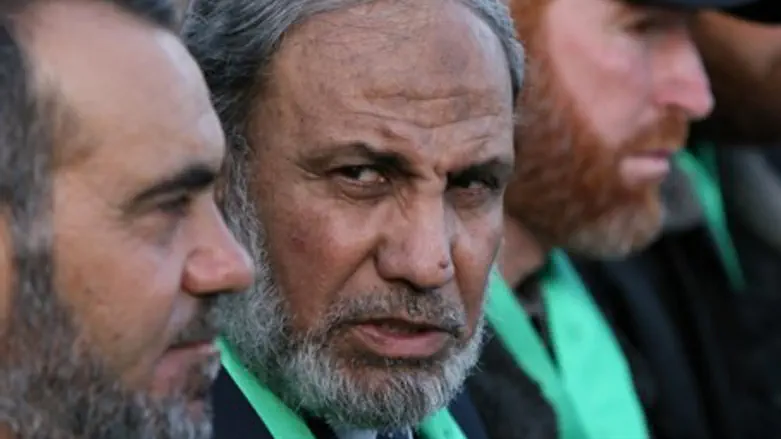
Hamas will never recognize Israel's right to exist or put its terrorist army under Palestinian Authority (PA) control according to a senior Hamas official, who on Tuesday revealed his version of the unity government deal reached last Wednesday.
PA Chairman Mahmoud Abbas declared on Saturday that the new government will "obey my policy," and would "recognize Israel and reject violence and terrorism, and recognize international commitments," even as he re-declared the government would never recognize Israel as the Jewish state - a point Hamas concurred on.
However Mahmoud Al-Zahar, a senior official and co-founder of Hamas, had a different recollection of the unity deal.
"Abbas is not telling them the truth. He says 'this is my government'. But it is not his government. It is a government of national unity. He is marketing it in this way to minimize (international) pressure," Zahar told Reuters.
Speaking of that international pressure, Zahar cited the Israeli suspension of talks before their March 29 deadline and implementation of sanctions, as well as American talk of cutting funding to the PA over the unity with Hamas.
According to Zahar, Abbas "is trying to overcome a great wave of pressure," adding that Hamas is waiting for steps to be taken establishing a unity government, having handed over a list of possible ministers. Zahar further noted that Abbas "is seeking a guarantee that US financial support will continue."
"Nobody will touch our troops"
Another point that was not addressed in the unity deal is the question of who will hold control of the armed forces of the PA and Hamas.
The PA's Western-trained forces have in the past cooperated with Israel in security matters in Judea and Samaria, which Zahar called "shameful." Hamas's military wing is estimated to include roughly 20,000 terrorists.
Regardless of the unity deal and whoever wins the elections for the unity government, Zahar pledged that Hamas would stay in control of its own fighters, effectively maintaining the organizational and military split between the rivals.
"Nobody will touch the security sections in Gaza. No one will be able to touch one person from the military group. Nobody asked for that," Zahar declared.
After winning elections in Gaza in 2006, Hamas seized control of the area and physically forced out those loyal to Abbas a year later.
Who saved whom, Abbas or Hamas?
Regarding the power balance between the PA and Hamas, Zahar insisted that the unity deal was not a case of Abbas picking Hamas off the floor after Egypt banned the terrorist group, but rather because peace talks between the PA and Israel were at a dead end.
"He is very weak," Zahar said of Abbas, whose term in office expired five years ago.
Speaking about the banning of Hamas in Egypt, and the collapse of the Muslim Brotherhood, an ally of Hamas, in the country following former President Mohammed Morsi's ouster last July, Zahar called the changes a "catastrophe" for the region.
The Hamas leader also noted on the change of relations with Iran after Hamas refused to help support Syrian President Bashar Assad in the ongoing Syrian bloodbath.
"We have a good relation (with Iran), but you know the impact of the Syrian problem is still a factor," said Zahar, adding "the communication is not as it was."